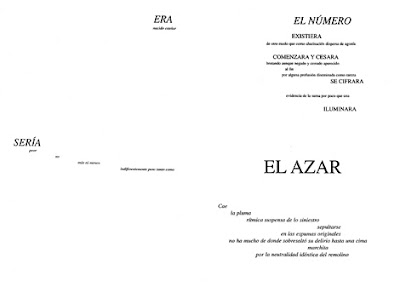Wallace Fowlie, Mallarmé.
Chicago and London: The University of Chicago Press, 1970; originally published
in 1953.
Wallace Fowlie (1908-1998)
romps through Stéphane Mallarmé’s life (1842-1898) and writings, providing English translations and comparisons with interconnected poet-writers like Edgar Allan Poe and Charles Baudelaire along the way. Not neglected are Paul Verlaine, Arthur Rimbaud, Joris-Karl Huysmans, Marcel Proust, or Paul Valéry, nor Symbolist painters such as Odilon Redon,
or composers Richard Wagner, Claude Debussy, Maurice Ravel, and others.
Symbolism is oft the name given to Mallarmé’s “style,” which is related to all of the above.
Symbolism is oft the name given to Mallarmé’s “style,” which is related to all of the above.
I’ve
chosen a handful of Fowlie’s quips that may or may not shed light on the
creation of poems specifically and artistic impulses in general. It’s your
call.
“The poem is the
surviving mystery.” (p. 188)
“The legend of Mallarmé’s
life was the great work dreamed by him, the unique work destined to subsume all
other works. But it was never composed.” (p. 194)
“A doubling of
the consciousness is indispensable for the artist.” (p. 197)
“The struggle of
the artist to create out of the chaos of experience is not unlike a tempest of
nature. The mystery of all art is the seeming chance, a throw of dice . . . out
of which an order of logic and construction is achieved.” (p. 218)
"Poetry is a
game of risk, of magic and incantation. Its meaning is always hidden under the
brilliance of its images and the unusualness of its analogies.” (p. 223)
“At some point
or other in the fabrication of [a] poem the poet is helpless and useless before
the gift of chance.” (p. 226)
“The experience
of religion for Mallarmé seems to have been completely merged with that of art,
and particularly joined with the experience of theatre and music .” (pp. 235-236)
“The dead move
and have their being in the words they leave. To live is to endure dangers, to
move from one disaster to another.” (p. 247)
“First as a man [Mallarmé ] made himself different from other
men. And then as a poet he celebrated language, the sanctity of language, as a
new Orpheus.” (p. 287)
And so adieu: a salute to Wallace Fowlie and Stéphane Mallarmé.
Today's Rune: Strength.















3 comments:
I think it would take me forever to read, as I would continuously be pausing and pondering what I just read.
I like what William Zinsser said about symbolism, about how he always misses it. I'm kind of the same way.
Ya know what the quotes and paintings remind me of Erik--perhaps the foundation on which Dada was formed, seems to be an early incarnation of that thought of art being the final expression of itself.
Post a Comment